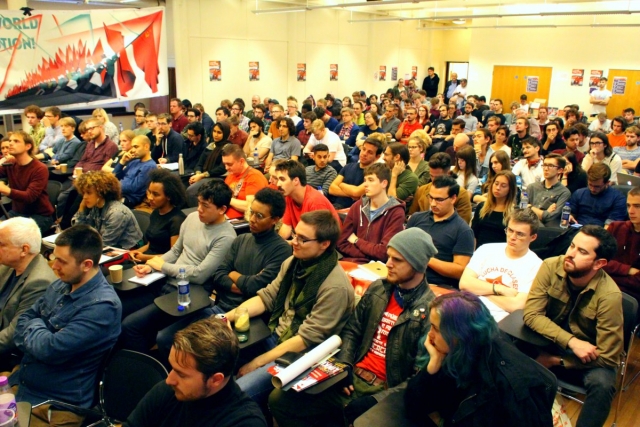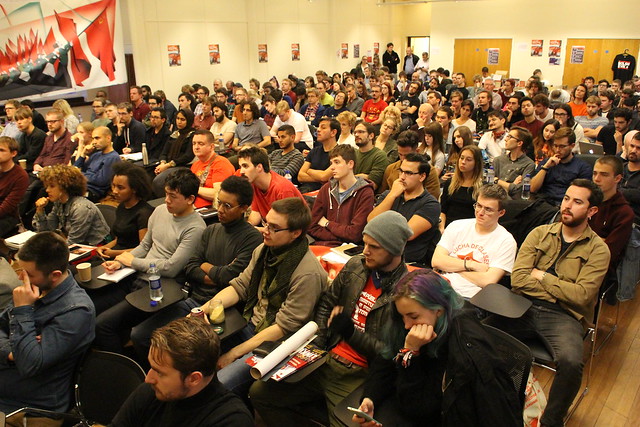We report from the October Revolution festival - five days of inspiring activities, events, and discussions celebrating the centenary of the Russian Revolution.
Last weekend, from 19-23 October, over 300 Marxists from across Europe, gathered in London for the October Revolution festival - an inspiring commemoration of the centenary of the Russian Revolution.
Throughout the five-day festival, the enthusiasm, energy, and incredible political level of the young Marxist activists present was clearly on display. The confident and passionate mood was palpable, with all those in attendance commenting on how stirring and stimulating the weekend’s discussions were.
One Swedish comrade, who had never been to such an event before, said that he would never have expected that he could learn so much in just a few days as he has done at the festival. Another attendee from Norwich stated that he was amazed at the depth of knowledge on display in the weekend’s discussion, and also at the reach of the International Marxist Tendency, with comrades present from all over Britain and Europe.
Above all, it is this revolutionary energy and enthusiasm seen at the festival that is the most fitting celebration of the 1917 October Revolution - for Marxists, the greatest event in human history.
Exploring London’s revolutionary history
Alongside the weekend’s political and theoretical discussions, international visitors were treated to a series of activities surrounding the main event. Through these extra activities, attendees were able to explore the revolutionary history of London and the city’s links to the lives of Marx, Engels, Lenin and Trotsky.
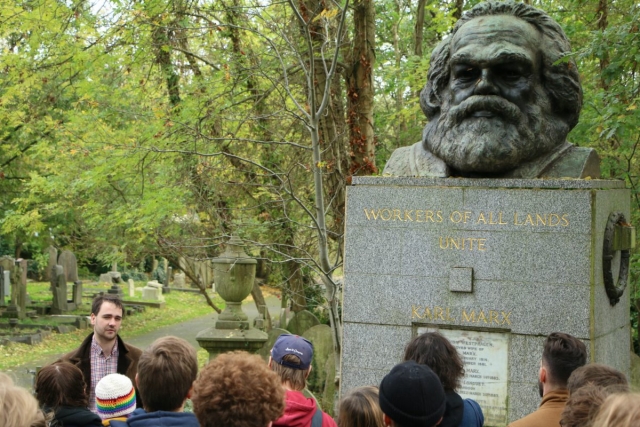 Visiting Marx's grave / Photo: own work
Visiting Marx's grave / Photo: own work
On the Thursday (19th October), for example, there was a walking tour around London to see the sights where Vladimir Lenin lived and worked in the city. Rob Sewell, editor of Socialist Appeal, led the tour, which included comrades from Britain, France, Belgium, Denmark, Sweden, Greece, Germany, Austria, Spain and Poland. Highlights included a visit to the house where Lenin and Trotsky met for the first time.
The tour ended in a crowded room above the Crown Tavern in Clerkenwell Green, next door to the Marx Memorial Library, where Lenin had his office when he was working in London. Here, Alan Woods - author of Bolshevism: the Road to Revolution - spoke about the history of Bolshevism in Russia, from its birth up to the 1905 Russian Revolution.
On Friday (20th October) comrades visited Highgate cemetery, the final resting place of Karl Marx. Ben Gliniecki from the Socialist Appeal editorial board spoke about the last ten years of Marx’s life, during which he wrote his Critique of the Gotha Programme, despite his ill health. Extracts from Engels’ speech at Marx’s graveside were also quoted, in which Engels paid tribute to Karl Marx’s contribution to the struggle of the international proletariat. The visit concluded with a rousing rendition of the Internationale, sung by Marx’s grave in ten different languages.
On Monday, meanwhile, the festival’s activities continued at the British Museum - where Marx wrote Capital - for a Marxist tour of the artefacts in the museum.
Josh Holroyd and Adam Booth, respectively, gave historical materialist analyses of the exhibitions on Mesopotamia and money, outlining how class society developed and how money has evolved over time. Such insights, in turn, allowed those on the tour to see how we can fight against the exploitation of class society and the evils of capitalism today.
Rally for the Russian Revolution
The highlight of the festival for many was undoubtedly the opening rally on Friday night, dedicated to the 1917 Russian Revolution and its centenary anniversary.
An audience of around 150 revolutionary activists were in attendance at the packed rally, which began with the premiere of a new documentary about the life and ideas of Leon Trotsky, produced by the International Marxist Tendency. The documentary gave a detailed analysis of Trotsky’s role in leading the Russian Revolution, as well as highlighting Trotsky’s defence of the traditions of Marxism and Bolshevism against the Stalinist bureaucracy, who eventually ended his life on 21 August 1940.
The keynote speech at the rally was given by Leon Trotsky’s grandson, Esteban Volkov, who joined the meeting via video link from the Trotsky museum in Mexico, in the house where Trotsky was assassinated.
Volkov gave a rousing defence of his grandfather and the ideas of genuine Marxism, thanking the International Marxist Tendency for the work that the organisation has done in keeping these ideas and traditions alive today. Esteban finished his contribution by imploring the crowd of young revolutionaries present to take inspiration from the Russian Revolution and go forward in building the forces of Marxism.
The Friday rally was closed by Alan Woods, who spoke about the significance of the Russian Revolution for revolutionaries today.
As well as discussing the Revolution’s impact, Alan also answered the lies, distortions and myths surrounding the October Revolution and the role of Lenin. Despite all of the attempts to slander the legacy of 1917 and the Bolsheviks, Alan stressed that the Russian Revolution still provides us with an incredible inspiration today as we fight for a worldwide socialist society.
The revolutionary ideas of Marxism
The festival continued on Saturday with a programme of discussions about Marxist theory and practice. Topics included: a Marxist critique of postmodernism; the origins of terrorism; an introduction to Marxist economics; an analysis of Fascism and the far right; what is a revolution?; the rise and fall of neoliberalism; the nature of imperialism today; and a history of socialist struggles in Scotland.
Amongst the many highlights was Gerry Ruddy’s talk about the history of the Troubles in Ireland, given to a packed room, with people sitting on the floor and standing at the back in order to listen to the talk and participate in the discussion.
On the Saturday evening, over 200 people crowded into the main hall for the evening’s rally supporting Corbyn’s Labour Party and the fight for a socialist Labour government. The rally was addressed by two leading trade unionists: Steve Hedley, Senior Assistant General Secretary of the RMT railway union; and Paul Holmes of the Unison NEC, speaking in a personal capacity.
Steve Hedley spoke about the impact of the Russian Revolution on the British Labour movement, 100 years ago, whilst Paul Holmes gave an overview of the Corbyn movement and the class struggle in Britain at the present time.
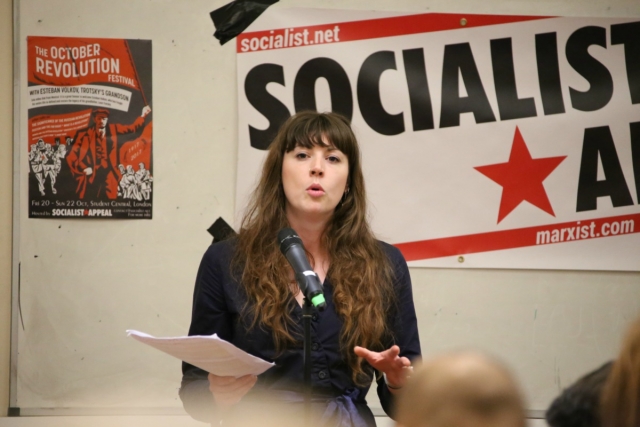 Natasha Sorrell speaking on Marx's Das Kapital / Photo: own work
Natasha Sorrell speaking on Marx's Das Kapital / Photo: own work
Natasha Sorrell, a teacher and Socialist Appeal activist, also gave a moving speech about the attacks on teachers and the whole education sector under this brutal Tory government, calling for socialist policies as the only way forward.
Rob Sewell, editor of Socialist Appeal, ended the rally by analysing the crisis facing British capitalism and its Tory representatives, highlighting the anti-establishment mood that has now erupted out into the open with the rise of Corbyn’s Labour.
Rob stressed that the Marxists in Britain will fight for the election of a Corbyn Labour government. However, Rob also wanted that such a government would be faced with a campaign of sabotage from the ruling class from day one, and would need to take emergency measures and carry out a bold socialist programme.
“Labour must not bend the knee to capital, as in the past,” Rob emphasised. “It is now the centenary of the Russian Revolution. We should commemorate this event by committing ourselves to this struggle today.”
Ed Swanepoel of the Reading Marxists made these comments about the weekend, and the Saturday rally in particular:
“The October school which took place in London this past weekend was a fantastic gathering of Marxist minds and radical revolutionaries. All of the sessions that I attended were very informative and educational and really showcased how socialist ideas can change the world.
“Out of all the excellent talks that took place over the weekend, the rally on Jeremy Corbyn and the Labour Party was particularly interesting. Marxist ideas are often asserted (by Marxism’s critics) as being too dogmatic or not fit for purpose in the 21st century; ideas that are idyllic but not practical. Saturday evening’s rally dispelled that myth.
“Having members of some of Britain’s biggest trade unions speak to the meeting helped crystallise the task facing the workers’ movement in Britain and showed how our revolutionary ideas are the tools required to overthrow capitalism and build a socialist alternative.
“The struggles of the working class in 2017 are not at all different from the ones faced by the workers of Russia in 1917. The centenary celebrations of the October Revolution proved once again how relevant Marxist ideas are in today’s fight for a fair and equal society. I look forward to the next conference!”
Finally, an excellent collection, led by Fred Weston, editor of www.marxist.com<, raised around £4,500 for the IMT, demonstrating once again the enthusiasm amongst those present. This followed by an enjoyable social of drinks and music, at which young attendees continued the day’s passionate discussions.
A history of revolution
Further sessions were held on Sunday, with meetings on: Stalinism; Marxism and the Labour Party; dialectical philosophy; automation under capitalism; Trotsky’s theory of the Permanent Revolution; and the relationship between art and revolution.
One most important discussions was on the astonishing events in Catalonia. Jorge Martin gave a fascinating historical overview on the question of Catalan nationalism, explaining its origins and developments over the centuries.
Importantly, Jorge highlighted, the 1978 Spanish constitution provides no democratic rights on the question of independence and separation. The struggle for an independent Catalonia, therefore, Jorge stressed, is a revolutionary task that can only be carried through by the masses, and which has the potential to break the repressive Spanish regime and ignite the spare of revolution across the whole Iberian peninsula.
Joe Attard from the KCL Marxist society provided this report about the session on Marxism and the Labour Party:
“On Sunday morning, Jack Halinski-Fitzpatrick introduced a discussion on the Labour Party, outlining its history and explaining the role of revolutionaries in the organisation today.
“Jack pointed out that Marxists were among the founding members of the Labour Party, via the Social Democratic Federation, and that the party was considerably more radical in its early years (particularly in the aftermath of the Russian Revolution): openly advocating the transfer of the means of production to the working-class. Moreover, the lack of a mass Communist Party left the Labour Party as the ‘only game in town’ for the British left, resulting in Labour becoming very entrenched in the traditions of the British proletariat.
“In spite of decades of betrayals from its reformist and Blairite leadership, therefore, the Labour Party remains a major focal point for the British workers’ movement, as evidenced by the wave of support behind Jeremy Corbyn, who has served as a lightning rod for the anger of millions of workers and youth hammered by Tory austerity.
“Jack concluded that Marxists must be fighting inside the Labour Party, to advocate revolutionary ideas directly to the working class, and to help build radical currents in the party that can become a decisive factor in the event of a Corbyn-led government coming to power.
“Such a government would inevitably face a strike of capital; attempted political sabotage from within and without; and perhaps even resistance from the military. Only the organised working class and youth, armed with Marxist ideas, would be able to defend against such attacks and push Corbyn towards radical measures like expropriation of the commanding heights of the economy - and ultimately to socialism.”
John Russell from Norwich, meanwhile, gave these thoughts about the session on the origins of class society:
“In a session on the origins of class society on Sunday afternoon, Josh Holroyd led off the discussion with an in-depth and captivating explanation of the development of settled agricultural communities in the Mesopotamian region, and how these historical developments ultimately led to the creation of class society and the state.
“In his well researched and well structured talk, Josh provided many examples of real archeological sites, described the findings in these regions, and explained the conclusions that can be drawn from them, painting for the audience a detailed and rich narrative of this ancient and foundational period in our history as a species.
“With a Marxist understanding of history, and the archeological evidence available, we can analyse how and why the first class distinctions - and ultimately the first states - arose, and use this history to further our understanding of class-based state society today under capitalism.
“In the discussion following the introduction, excellent contributions from comrades with backgrounds in the fields of archeology and history provided further examples of these early class societies from other regions of the world, adding to and corroborating Josh's analysis.
“A truly fascinating session, the whole discussion was incredibly educational and demonstrated the wealth of expertise and knowledge of this subject present in the minds of young Marxists. Such a thorough understanding of the origins of class society provides a scientific basis for our understanding of class society today, and gives us insight into the possibilities of future classless societies.
A revolutionary celebration
The weekend finished with closing remarks by Alan Woods, who again highlighted the enthusiasm and high political level on display throughout the festival. Most importantly, Alan stressed the urgent importance of the revolutionary task facing us.
“We are fighting for the greatest cause in the whole history of humankind,” Alan emphasised. “We are fighting for the sacred cause of the emancipation of the working class - in Britain, in Europe, and on a world scale - and to raise society to unknown heights of culture, democracy, and civilisation.”
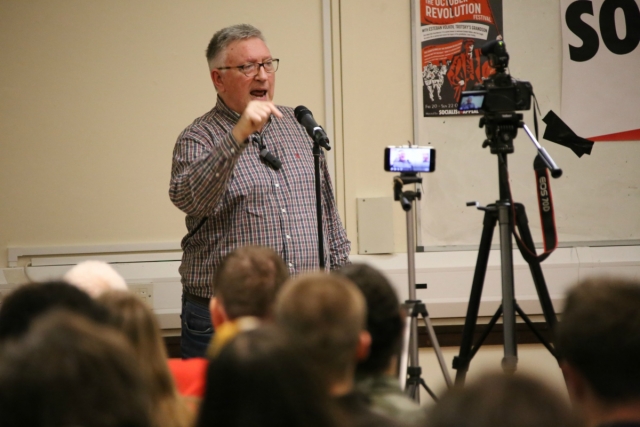 Alan Woods / Photo: own work
Alan Woods / Photo: own work
These inspiring words were followed by another rousing rendition of the Internationale, sung in a dozen different languages.
Overall, around 300 people attended this festival to celebrate the centenary of the Russian Revolution - the overwhelming majority of them being students and young workers. It should give us enormous confidence that, 100 years after the Bolsheviks led the Russian workers and peasants to the conquest of power, such large numbers are interested today in continuing the work of Lenin, Trotsky, and the Bolsheviks and fighting for socialist revolution.

